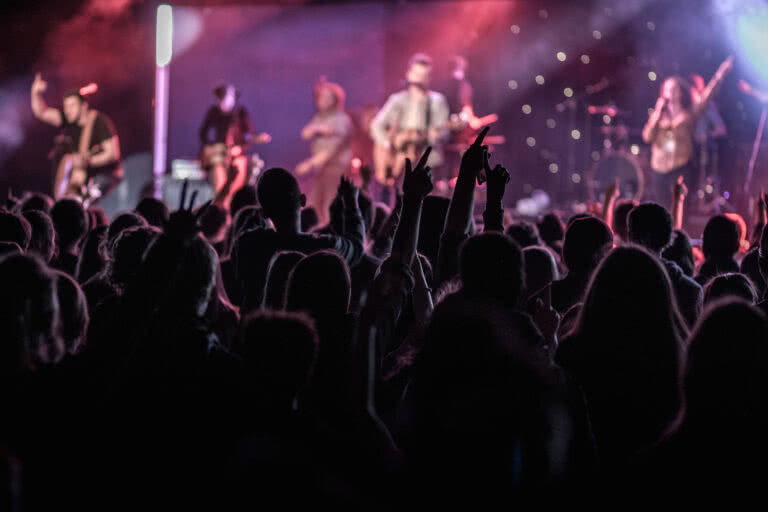COVID-19 restrictions are now largely absent from the live events scene, with many creators finally able to return to in-person music event planning. Event creators have learnt a lot since the start of the pandemic, and this new knowledge can be applied to organising music concerts in these ‘new normal’ times.
The benefits of virtual and hybrid events, such as flexibility and accessibility, suggest that they’re likely to become a regular fixture for many event creators. Whether it’s a drive-in music gig or livestreamed festival, creators found innovative ways to host events in line with government regulations during the pandemic. The option to provide online access is a great way to promote inclusivity and extend revenue streams, so should be a consideration for all forward-thinking organisers.
We caught up with Josh Harvey-Gomez, creative director/producer/instructor for Vintage Arts Asylum, to give us some practical advice on how to plan a music event following the reintroduction of in-person gigs, and what lessons he’s taken from keeping a community together online during the pandemic.
A step-by-step guide to live music event planning
For most event creators, the day of the event itself is just the tip of the iceberg – the other 90% is the planning and organisation that the guests don’t see. We’ve created a checklist of the most important steps of an event music plan with help from Harvey-Gomez, who has been hosting both swing dance classes and live jazz events in London for the last seven years with Vintage Arts Asylum.
1. Know your target audience
First things first: ask yourself who you’re creating the event for. For example, Harvey-Gomez tapped into a pre-existing global swing dance scene, so it’s worth doing your research to see if you can reach online communities with a shared interest in the type of music you plan to feature.
Harvey-Gomez finds Eventbrite particularly useful for getting to know his audience and their needs: “What I find helpful is the ability to get information about the type of clientele that I have, whether it’s their age group or the areas that they live – that’s been a pretty big perk.”
2. Establish your event goals
Establishing your goals early on can help to formulate the rest of your event plan and keep you on track for reaching specific targets. Consider the numbers of guests you want to attract, profit margins, marketing reach, and metrics for measuring engagement levels during the promotional stage, during, and after the event.
Harvey-Gomez recommends continual reflection and adjustment of goals. Reviewing these goals after 10 events allows him to see trends, what’s working, and what’s not. From looking at the averages from these events, he can then come up with a projected goal and make planning decisions in line with that goal, such as choosing venues with greater capacities or whether it’s necessary to raise the admission price.
3. Create a budget
Another important preliminary step. If you’ve set yourself a target net profit that you wish to make from the event, you’ll need to consider how to budget to make that goal achievable. Make a list of all your potential expenses, such as:
- Venue hire
- Performers’ fees
- Equipment rental
- Staff wages
- Insurance
- Catering
- Marketing/promotion
4. Choose the venue
Choosing the right venue is one of the most important aspects of event planning. If you’ve been limited to coordinating only virtual events in the last year or so, you may be rusty on what you need to consider. Make sure any prospective venues are appropriate in terms of:
- Layout – does your event need a stage or dancefloor? Will attendees require seating? Is there a bar or kitchen for you to make use of? Is the dancefloor placed inconveniently close to the kitchen, so that servers and dancers may clash? Are there adequate cloakroom facilities?
- Tech set-up – most music venues will already have ample facilities for sound, lighting, and other tech, but it’s worth cross-referencing what’s available with the musicians or DJs you’ve booked.
- Capacity – can the venue adequately hold the number of guests you’re expecting? Is it operating at reduced capacity for health/safety reasons?
- Location – are there nearby transport links for guests arriving on foot? Are there parking facilities?
Harvey-Gomez also points out that it’s worth checking out what the venue’s parameters and expectations of you are, in terms of scheduling, bar sales, or any element of your event that touches them. Working collaboratively with the venue can produce benefits for everyone. “I sometimes look at which night might not be their strongest or busiest and which one also works for me, then collaborate on those dates and times”, he says.
5. Get your staff
When planning Vintage Arts Asylum’s Jazz nights, Harvey-Gomez bases his planning around pulling together all the different personnel required to make the night a success. “It does always require a small army”, he confesses. “There’s creating a schedule with my musicians or other musicians, bringing them in, and then all the things behind the scenes that people don’t get to always see. So making sure I have my technicians if I need any – whether they’re sound, lighting, or volunteer staff that just help the event run. I’ve kind of developed a small template that helps me remember, all the roles I need.”
With this in mind, consider making a checklist of all the people you can foresee yourself needing to pull the event together.
6. Find the right music acts
After seven years, Harvey-Gomez has established good relationships with the musicians who perform live at his events. However, he also emphasises the need to scout out new acts to keep his event offerings fresh and his guests entertained. More established events will be lucky enough to get submissions from artists who want to perform at them. Creators of newer events can go out and watch the bands perform now that live events are back, keep an eye on their social media profiles, message them directly for samples of their music, or listen to what they have uploaded on different platforms.
7. Price your tickets
Now that you’ve established your budget and target profit, you can consider the price you can charge for tickets to your event. Harvey-Gomez likes to offer different ticket options, like early bird tickets with a discount. “It’s an incentive for the guests but it’s also good for business to get money rolling a bit early and build momentum”.
In line with the current climate, he has also added a ‘pay what you can’ option to his tiered-pricing model. “I write it down as: ‘listen, I understand times are tough, sometimes some weeks or some months we’re a bit more skint than others. But we would rather have you here than not. So, pay what you can now, and then come back, you know.'”
The result is that guests don’t just always choose to pay nothing. “People will pay full price to show that they support what you do and who you are. And it shows them that you do care about people being there, and they’re not just numbers to you.”
8. Marketing & promotion
You’ve organised your budget, venue, staff, and musicians, now you just need people to come. If you’ve held similar events in the past, Harvey-Gomez advises making sure you know where your guests can be found. Social media and flyering in targeted areas are his preferred methods. These methods can also work well if your event is a new one.
9. Covid-safe measures
Now that most restrictions have been lifted, COVID-19 measures are at the discretion of the host and venue but are no longer a legal requirement – but it’s still recommended to make sure your guests feel safe at your event. If you choose to continue with your own measures, you can do so by providing staff with COVID-safe training, asking for proof of vaccination or a negative test result, and making sure the venue is well-ventilated and regularly cleaned.
10. Cancellation
Something that we all took away from the pandemic is that cancellations can become an instant reality and are something you need to plan for. This involves having:
- A solid refund policy – consider offering credit for a future event as an option to retain business
- Good understanding of what the venue’s policies are on postponement or cancellation
- Flexibility with vendors
Harvey-Gomez says that his experience has been that “there is a lot of leeway that I’ve had with some venues and clients in understanding things that are happening, whether it’s an event postponement or cancellation because the band or the DJ got ill. In the past, a venue wouldn’t care, and would say ‘just give us the money that we had contracted’. And now it’s like, this is part of life.”
Getting back out there
If you’re thinking of holding a music event in the near future, the best thing you can do right now is to stay on top of local guidelines, put together a comprehensive concert planning checklist, and communicate all of the health and safety measures
that you’re taking to help make guests feel confident about attending. Find out more about how to plan a concert event and ensure your music event’s success with Eventbrite Boost.




